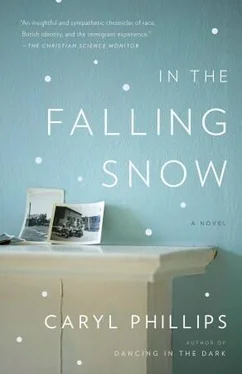‘He say he come back home to keep an eye on me. I look like a man who need somebody to keep an eye on me?’
The men all laugh, and his father winks playfully at his son. ‘Keith don’t know how to relax and just enjoy himself. Which don’t make no sense now that he get rid of the wife.’
Baron looks up at him and arches his eyebrows. Of all the men, he is closest to ‘Uncle Baron’ who, when he was growing up, seemed to be the most sensible of his father’s drinking pals. More importantly, he was the only one who ever remembered his birthday or bought him a present.
‘Keith, you get rid of the nice white lady?’
He shrugs his shoulders. ‘She’s still a nice lady, but you know how it goes. Sometimes you’re just not seeing eye to eye. It’s difficult with women, particularly if they’re the mother of your child.’
Baron laughs. ‘Man, I have a few of those knocking about the place.’
‘Mothers or children?’
‘Both, man, both. They come together like a package deal. Trouble always like company.’
As Baron throws his head back and laughs, he notices that his ‘uncle’ has lost his front teeth, which gives him a more mischievous appearance.
‘Son, don’t take it so hard. Listen to Baron, for he is telling you the truth. Women is nothing but trouble. You leave your wife, but you still got your health and that is all that matters. Plenty more fish in the sea.’
He looks at his father and wonders what on earth goes on in this man’s mind. One moment he is cold and aloof, barely communicating at all, the next minute he is smiling, and sorting out his dominoes, and acting as though he is the life and soul of the party.
He sits with his father for an hour, watching him laugh with his friends, but this one table aside, the centre is not a place of joy where men and women at the terminus of their lives can relax in comfortable surroundings. The television that is bracketed to the wall in the far corner of the room seems to be permanently tuned to soap operas, and a group of men in dressing gowns and bedroom slippers sit silently on plastic chairs in an obedient row and gawp helplessly at the screen. He has never been beyond this dayroom, so he has no idea what the flatlets are like, but he suspects that they too are most probably joyless. The centre radiates an aura of communal depression, and the attendants appear to behave more like watchmen than skilled helpers who have been trained to assist the elderly. However, in the absence of close family members, most residents have little choice but to seek admission and accept shelter, and thereafter go about the business of spending what little money they have saved from their working lives in England in order that they might make it to the end with some vestige of dignity. He looks at his father and realises that he clearly has no intention of leaving his game of dominoes any time soon, and so he stands and tells his father that he is going for a walk and he will see him back at the house. His father nods almost imperceptibly, for he remains focused on his hand of dominoes. The older man does not bother to look up as his son leaves the community centre.
It is after seven o’clock in the evening when his father finally walks in and clumsily hangs his coat over the back of a dining chair. His hair is now the shape of the pork-pie hat that he has just removed and dumped on the table, and he is clearly in need of a shave. He looks at his father, and then he picks up the remote and turns down the volume on the evening news. He gets to his feet and passes into the kitchen where he begins to fill the kettle, then he cranes his neck so that he can see his father.
‘Can I make you a cup of tea?’
His father rubs his stubbled face with the palm of his hand and nods before sitting down heavily on the sofa.
‘You look done in. Must have been a serious game of dominoes.’
‘I had to wait for the blasted bus, but I get fed up so I start to walk.’
He plugs the kettle in and then crosses to the door of the kitchen.
‘You’re not telling me you walked all the way back home? You can’t be serious?’
‘No man, I didn’t walk all the way back. I’d be dead if I try to do that. But I walk about half the way and that is more than enough for me.’
He spoons two sugars into his father’s tea and stirs, before rejoining him and handing him the cup. His father lifts the cup to his mouth and sips noisily at it, and then quickly sets it down on the floor. It is too hot.
‘Would you like me to make you something to eat?’
His father begins to laugh.
‘You can cook?’
‘Well, not exactly, but I went to the shop and bought some things. Stuff that’s easy to cook.’
‘I didn’t think you can cook. You looking to poison me, is that it?’ His father continues to chuckle. ‘Boy, I don’t need no food. I ate something at the centre. The people know me good so sometimes they let me take a six o’clock dinner with the boys.’
His father picks up the tea again, and this time he swallows a mouthful before setting it down and leaning back into the sofa. His father closes his eyes and he can tell that the exhausted man has fallen asleep.
Earlier in the day, having left his father playing dominoes at the Mandela Centre, he took a bus to the cemetery. He got off a stop early, having remembered that the short row of local shops included a greengrocer’s, and he bought what the Chinese guy behind the till described as ‘a mixed bunch’. He told the man not to roll the flowers in a tube of decorative paper, and he took them from him in their plain cellophane wrapping. The afternoon was cold and overcast, and as he passed through the gate he saw an elderly lady with a terrier on a lead, but this lady and her dog aside, the place appeared to be deserted. He was surprised how easily he remembered the location of Brenda’s grave, and once there he stood over the simple marble slab and set down the flowers.
After his thirteenth birthday, when he went to live with his father, he began to visit Brenda after school, and at weekends, for his father’s house was only a twenty-minute bus ride away. If he and Brenda were watching television and it got too late, or if things between himself and his father were not so good, then he would stay overnight in his old room at Brenda’s. The usual source of contention between himself and his father was the number of strange women who seemed to pass through the house, and his reluctance to call them ‘Auntie’. Father and son did attempt to maintain some kind of cordial relationship with each other, but as he grew older they mainly strove to keep out of each other’s way. He never asked Brenda directly about what had happened between herself and his father, but Brenda let him know that his father had suffered two ‘breakdowns’, one shortly after she met him, and then a second, bigger one after they were married and the three of them were all living together. It was she who had made the decision to call the police and section him the second time, but Brenda was adamant that his problems were not all of his own making. ‘He’s sick, Keith, so you have to be a bit easy on him. Hospital changed him, both times, from a quiet man who used to read all the time, and who kept himself to himself, into a depressed and anxious man. But the doctor told me that’s the risk with the shock treatment. You know, the electricity. They eventually get better but they change. I’m sorry love, but he changed and I suppose we all had to just move on with our own lives, but your father never liked the fact that I was ready to move on.’ Brenda’s reference to moving on still disturbs him, for during the years on the Whitehall Estate he had not been aware of any other man in her life beyond himself. His father was convinced otherwise, and had bitterly accused her of infidelity while he was in hospital, but as a teenager this was not a subject that he wished to discuss with his father. However, he had twice come home early from school and noticed a maroon Ford Capri parked by the back gate. Instead of coming in he had chosen to walk around the estate for an hour and come back when the car was gone and, of course, he never mentioned anything to Brenda about the mystery Ford Capri. Brenda once made reference to his mother, in a way which suggested that she knew more if he wished to know more, but he already understood that this was a subject that he and his father would have to sort out between them. As much as he cared for Brenda, he had no interest in learning about his mother from her, and she never brought up the subject again.
Читать дальше









![Unknown - [Carly Phillips] The Bachelor (The Chandler Brothe(Bookos.org) (1)](/books/174132/unknown-carly-phillips-the-bachelor-the-chandle-thumb.webp)


